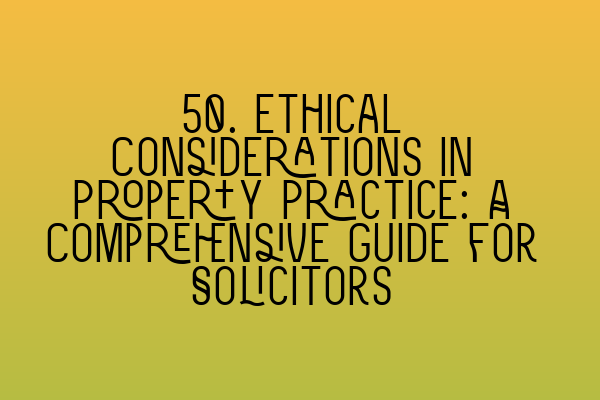50 Ethical Considerations in Property Practice: A Comprehensive Guide for Solicitors
As a solicitor practicing property law, it is essential to not only uphold the legal principles and regulations but also to consider the ethical aspects of your practice. Ethical considerations play a crucial role in maintaining the integrity of the legal profession and ensuring the best interests of your clients and the public are protected.
In this comprehensive guide, we will explore 50 ethical considerations that all solicitors practicing property law should keep in mind. These considerations cover a wide range of areas, including client representation, confidentiality, conflict of interest, professional competence, advertising, and more.
1. Client Representation
When representing clients in property matters, it is essential to act in their best interests, provide competent advice, and ensure their rights are protected. This includes:
- Adhering to client instructions: Always follow your client’s instructions while providing appropriate advice and guidance. However, be cautious if those instructions conflict with legal or ethical obligations.
- Avoiding conflicts of interest: Ensure that you do not represent clients whose interests conflict with each other. If a conflict arises, seek independent legal advice.
- Representing vulnerable clients: Pay special attention to the needs of vulnerable clients, such as the elderly or disabled.
- Ensuring transparency: Be clear and transparent with your clients about all aspects of their case, including fees, potential risks, and anticipated outcomes.
2. Confidentiality and Data Protection
Confidentiality is a cornerstone of the solicitor-client relationship. Upholding confidentiality and complying with data protection laws are vital ethical considerations:
- Maintaining client confidentiality: Ensure that all client information remains confidential and is not disclosed without proper authorization.
- Secure storage and transmission of data: Implement appropriate measures to protect client data from unauthorized access or loss.
- Complying with data protection laws: Stay up-to-date with data protection regulations and ensure that you comply with them at all times.
- Obtaining informed consent: Obtain informed consent from clients before disclosing any information that may breach their confidentiality.
3. Conflict of Interest
Conflicts of interest can arise when a solicitor’s personal or financial interests clash with their duty to act in their clients’ best interests. To avoid conflicts of interest:
- Identify potential conflicts: Conduct thorough conflict checks before accepting a new client.
- Decline representation when necessary: If a conflict of interest exists, decline representation or seek appropriate waivers from affected parties.
- Separate representation: If multiple clients have conflicting interests, consider whether separate representation is required.
4. Professional Competence
Being competent in property law is not only an ethical duty but also a professional obligation. To maintain professional competence:
- Continuing professional development (CPD): Regularly participate in CPD activities to enhance your knowledge and skills in property law.
- Staying updated: Keep abreast of changes in property law, regulations, and case precedents.
- Consulting colleagues and experts: Seek advice from colleagues or experts when dealing with complex or unfamiliar areas of property law.
5. Advertising and Marketing
When promoting your property law practice, it is crucial to ensure your advertising and marketing methods are fair, accurate, and not misleading:
- Accuracy and truthfulness: Ensure that all information provided in your advertisements is accurate and truthful.
- Avoiding misleading statements: Do not make false or misleading statements that may deceive potential clients.
- Clear fee disclosure: Clearly disclose your fees and any potential additional costs in your advertising materials.
These are just a few of the ethical considerations that solicitors practicing property law should keep in mind. By maintaining high ethical standards, you not only uphold the integrity of the legal profession but also provide the best possible service to your clients.
For more information on ethical considerations or to enhance your property law knowledge and prepare for SQE exams, check out our related articles:
- SQE 1 Practice Exam Questions
- SQE 1 Practice Mocks FLK1 FLK2
- SQE 2 Preparation Courses
- SQE 1 Preparation Courses
- SRA SQE Exam Dates
At SQE Property Law & Land Law, we provide comprehensive preparation courses for both SQE 1 and SQE 2 exams. Our expert tutors and study materials will help you excel in your property law career. Contact us today to learn more!
